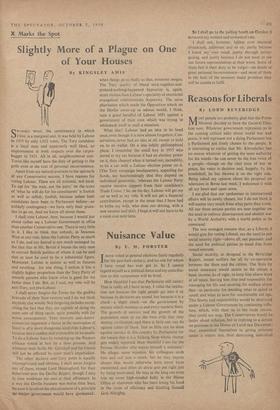Reasons for Liberals
Ity LORD BEVERIDGE
MosT people are probably glad that the Prime Minister decided to have the General Elec- tion now. Whatever government represents us in the coming critical talks about world war and peace, it will represent not a dying Parliament but a Parliament just freely chosen by the people. it is interesting to realise that Mr. Khrushchev has no means whatever of getting the same authority for his words—he can never be the free voice of a people—though on the vital issue of war or peace, his voice is decisive and, happily, by his bombshell, he has thrown it on the right side. Being asked my opinion about his proposal on television in Berne last week, I welcomed it with all my heart and open arms.
I am glad that our spokesmen in international affairs will be newly chosen, but I do not think it will matter very much from what party they come. All our three serious parties are near together on the need to enforce disarmament and abolish war by a World Authority with a world police at its command.
The two strongest reasons that, as a Liberal, I would give for voting Liberal, are the need to put social security right—above all, our pensions; and the need for political parties to stand free from vested interests.
Social security, as designed in the Beveridge Report, meant welfare for all by co-operation between the State and the citizen. The State by social insurance would secure to the citizen a basic income,'as of right, to keep him above want at all times, leaving him free and responsible for managing his life and securing his welfare above that—in particular for deciding what to spend in youth and what to save for comfortable old age. This liberty and responsibility would be destroyed under a Labour Government by continuing infla- tion, which, with their tie to the trade unions, they could not stop. The Conservatives would be better about inflation, but in replying to a debate on pensions in the House of Lords last December, they committed themselves to giving pensions under a means test, thus destroying individual
saving by another route. Only strong Liberal influence can pull social security pensions out of the morass.
Freedom from vested interests is an even more important problem today. The Conservative Party has always been the natural prey of such interests, and with space, I could give examples of what has gone wrong through this of late. Today there is an interest of outstanding importance on the opposite side of politics. Having worked at social problems for fifty years, I have nothing but gratitude and admiration for the achievement of British trade unions during these years, in dealing with sweating and casual labour and unemployment, to say nothing of what they did for education.
But now they are an immense power, and all
power is dangerous, to the wielder as to others, if it cannot be controlled or recalled in sonic way as practicable as that by which we recall political power, by marking crosses secretly on a ballot paper.
I do hope that some of our trade union leaders, who have done so much for our past, will consider this. The combined industrial and political power of trade unions is an attraction to dangerous men to seek office in them as a step to destruction of the liberty that they hate. To make membership of a trade union compulsory, as it is in many trades, and then to tell every trade unionist that he should vote Labour, as the Trades Union Congress has just done, is a step to Communism.
Voting above all must be individually free.







































 Previous page
Previous page